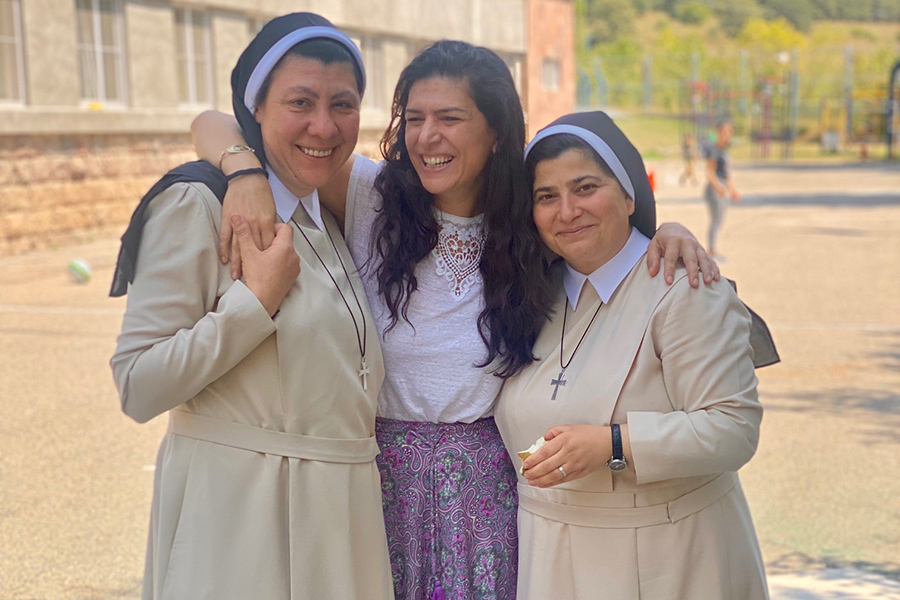Aurora Community member Elise Boghossian is the founder of EliseCare, a non-governmental organization of international solidarity that specializes on the treatment of pain. Its main goal is to provide emergency medical aid to the civilian population living in conflict zones. Among other countries and post-war zones, the organization also works in Artsakh (Nagorno-Karabakh).
– EliseCare is there, where the conflict is. Where are you now and what are your main activities?
EliseCare is currently active in Iraq, Syria, Ethiopia, Lebanon and Armenia, Nagorno-Karabakh. It provides emergency medical and psychological assistance to war survivors, victims of violence and torture, sexual slavery and human trafficking. For example, each month, we provide more than 2,000 free treatments in Iraq through our 3 mobile clinics that run through 30 isolated sites. We also have two fixed dispensaries near Zakho and Erbil offering permanent access to healthcare for the populations living in these two camps. We also take care of street children and child soldiers, mainly in Iraq.

– How did you come up with the idea of establishing the EliseCare NGO? Was there a specific reason behind it?
I founded EliseCare NGO shortly before the centenary of the Armenian Genocide perpetrated by the Turks against the Armenians in 1915. It was in 2012, during the Syrian conflict. My Armenian grandparents had been deported to Syria a century ago. So, I couldn't sit idly by, watching the terrible pictures of Syria on TV. It was then that I first went to a war zone to help.
Day by day, the situation worsened in Syria, and then in 2014 in Iraq, the amount of displaced people and refugees grew more and more. To respond to the issue of this population being so far away from the medical centers and the difficulty of healthcare access for them, EliseCare created mobile clinics on the base of old buses. Travelling from place to place, these buses provide regular care of all specialties combined: general medicine, gynecology, pediatrics, surgery, pregnancy monitoring, postpartum care, mental healthcare, pain treatment and acupuncture.
– You have been involved in humanitarian work for almost a decade. How have the challenges changed in this time? What are the main issues now?
Today, we are working on the long-term aspect of emergencies – violations of the rights of women and children, whether in war zones or in post-conflict situations, are our new challenges with the programs we run for orphans or female victims of mutilation. One of our programs called “Survivors’ Center” was created for women and children who have experienced terror and physical and psychological suffering in the territories occupied by ISIS. The program is implemented in our stationary clinics in the North of Iraq and in our mobile clinics that operate though the province of Duhok (Kurdistan region). With teams of doctors, psychologists, acupuncturists and gynecologists on board, we work with traumatized people via medical care, psychotherapy sessions and therapies such as EMDR (Eye Movement Desensitization and Reprocessing), hypnosis or even yoga. This work of healing and regular follow-up is essential to their physical wellness, as well as their morale.

– EliseCare, as an organization of pain management, also operates in Artsakh (Nagorno-Karabagh). What are your main activities in the region?
Between 2002 and 2011, I’ve been regularly travelling to Armenia and Nagorno Karabakh to provide assistance to the civilians affected by the war. At first, I worked with one of the hospitals in Yerevan, then I started my work directly on site in Nagorno-Karabakh. As I’ve already mentioned, acupuncture is among the services that we provide and it’s very effective in providing real help to those wounded in the war, especially to relieve them of severe pain. This is about pain management. This has been one of our main activities.
The resumption of hostilities in Nagorno-Karabagh on September 27, 2020, and the worsening humanitarian situation in the following months led us to resume our activities in Nagorno-Karabakh in 2020, establishing three mobile clinics using the same model as in Iraq. So in Nagorno-Karabagh, we have a presence along the front lines, in the gray areas where Armenians live under Russian protection. There is, unfortunately, a “medical desert” (a term used to describe regions where the population has inadequate access to healthcare – Aurora) in these very dangerous regions where 30,000 Armenians live. Our mobile clinics provide care to families residing in those villages.

– Aurora supports modern-day heroes like you, highlighting their vital work on the ground. What does being part of this community mean to you?
Having the support and visibility, thanks to an organization like yours, is a mark of recognition that allows us to plan and implement our activities with public authorities and with European bodies in connection with human rights. It is very important to carry the voice of the victims beyond the lands where they are suffering and to work on the process of peace-building and reconstruction with the help of the international community.


